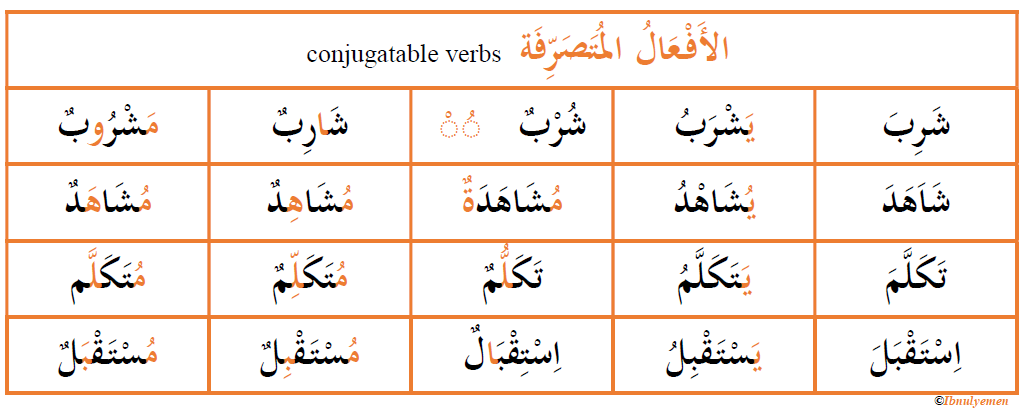Arabic Verb Forms [Conjugatable vs. Non-conjugatable] Posted by Ibnulyemen اِبْنُ اليَمَن on Jul 24, 2017 in Grammar, Vocabulary
Arabic verbs are either fully conjugatable, partially conjugatable, or non-conjugatable. In Arabic grammar, this classification is referred to as مُتَصَرِّف mutaSarrif ‘conjugatable’, مُتَصَرِّف نَاقِص mutaSarrif naqiS ‘partially conjugatable’ and جَاِمد jamid ‘non-conjugatable.’

What I mean by conjugating a verb is basically to derive different forms of the verb from the root verb. These forms signify the time of an action, agent (i.e. doer), or number and alike. Look at these English examples:
1) Conjugatable:
present past past participle present participle
plays/play played played playing
goes/go went gone going
be/am/is/are was/were been being
2) Partially conjugatable:
present past past participle present participle
can could …… ……
shall should …… ……
must must …… ……
In (a), the verb has four forms representing the present, past, perfect (completed), and progressive (ongoing). Some are regular and other are irregular, but all are conjugatable.
In (b), the verbs are defective, i.e. have incomplete conjugation. More specifically, there are no forms for the participles. Therefore, they should and could only be used with other verbs to add various meanings, such as certainty, possibility, and obligation.
We can cite somewhat similar account to describe the conjugation of Arabic verbs. Look at these examples (*)
1) مُتَصَرِّف mutaSarrif ‘conjugatable’:
Pastمَاضِ present مُضَارِع verbal nounمَصْدَر active participle فَاعِل
شَرِبَ ‘drink’ يَشْرَبُ شُرْب شَارِب
شَاهَدَ ‘watch’ يُشَاهِد مُشَاهَدَة مُشَاهِد
قَادَ ‘lead’ يَقُوْد قِيَادَة قَائِد
أَخْرَجَ ‘direct a film’ يُخْرِج إِخْرَاج مُخْرِج
Examples:
- جُوْن شَرِبَ الخَمْرَ. ‘John drank the wine.’
- جُوْن يَشْرَب الخَمْرَ كُلَّ مَسَاء. ‘John drinks the wine every evening.’
- جُوْن يُحِبُّ شُرْبَ الخَمْر. ‘John likes drinking wine.’
- مَنْ شَارِب الخَمْر؟ جُوْن. ‘who is the wine drinker? John.
- جُوْن مُوور أَخْرَجَ فِيْلم 9/11. ‘John Moore directed 9/11.’
- جُوْن مُوور يُخْرِجُ أَفْلام الحَرب. ‘John Moore directs war films.’
- إِخْرَاج مُوُور لِفِيلم خَلْف خُطُوط العَدُو جَيْد. ‘Moore’s direction of Behind Enemy Line is good.’
- جُوْن مُوُور مُخْرِج جَيْد. ‘John Moore is a good director.’
2) مُتَصَرِّف نَاقِص mutaSarrif naqiS ‘partially conjugatable’. Verbs of this type exist in two forms, past and present only. The verbs listed are the most common used in MSA.
a) past forms:
مَا زَال ma zaal ‘was/were still, continued to be/do’
كَاد kad ‘was about to’
Examples:
- مَا زَالَ مُحَمَّد فِي الغُرْفَة. ‘Mohammed is still in the room.’
- الطُّلابُ مَا زَالُوا فِي المَدْرَسَة. ‘the students are still in the school.’
- كَادَتِ القَارِبُ أَنْ يَنْقَلِبَ بِسَبَب المَوْج. ‘the boat was about to capsize because of the tide.’
- الطُّلاب كَادُوا أَنْ يَرْسَبُوا لأَن الامْتِحَانَ صَعْب. ‘the students were about to fail because the test was difficult.’
b) present forms:
لا يَزَال ، مَا يَزَال la yazaal, ma yazaal ‘is/are still, continue(s) to be/do’
يَكَاد yakad ‘is/are about to’
Examples:
- لا يَزَالُ مُحَمَّد فِي الغُرْفَة. ‘Mohammed is still in the room.’
- الطُّلاب لا يَزَالُوْنَ فِي المَدْرَسَة. ‘the students are still in the school.’
- يَكَأدُ القَارِبُ أَنْ يَنْقَلِب. اُنْظُر! ‘the boat is about to capsize. Look!’
- الطُّلابُ يَكَادُون أَنْ يَبْكُوا. الاِمْتِحَانُ فِعْلاً صَعْب. ‘the students are about to cry. The test is really difficult.’
3) جَامِد jamid ‘non-conjugatable’:
a) Verbs that exist only in the past form:
لَيْسَ laysa ‘not’
مَا دَامَ ma dama ‘as long as’
Examples:
- لَيْسَ أَحْمَد طَبِيبًا. ‘Ahmed is not a doctor.’
- الطُّلاب لَيْسُوا مُجْتَهِدِين. ‘the students are not studious.’
- مَا دَامَ الجَوُ جَمِيْلاً سَأَلعَب حَتَى غُرُوب الشَّمْس. ‘as long as the weather is nice I will play till sunset.’
b) Verbs that exist only in the present form:
يَنْبَغِي أَنْ yanbaghii an ‘it is necessary that ..’
يَجِب أَن yajib an ‘it is essential/a must that …’
Examples:
- يَنْبَغِي أَنْ نَذْهَبَ الآن. ‘it is necessary that we go now.’
- يَجِبُ أَنْ يُذَاكِرَ الطُّلابُ جَيْدًا. ‘it is essential that the students study well.’
- الطًّلابُ يَجِبُ أَنْ لا يَكْسَلُوا اليَوْم. ‘it is essential that the students don’t slack today.’
c) Verbs that exist only in the imperative form:
هَات hat ‘give me’
تَعَال ta‘al ‘come, come here’
Examples:
- هَات العَصِيْر مِنْ فَضْلِك. ‘bring the juice, please.’
- هَاتُوا الغَدَاءَ لَوْ سَمَحْتُم. ‘all of you, bring the lunch, please.’
- تَعَال إِلَى هُنَا يا جُوْن. ‘come here, John.’
- تَعَالُوا مَعِي مِنْ فَضْلِكُم. ‘all of you come with me, please.’
Notes on Usage:
- When the subject (doer) precedes the verb, the verb has to agree in number and gender except with يَنْبَغِي أَنْ and يَجِبُ أَنْ, the remain the same.
- مَا زَالَ and مَا يَزَالُ and لا يَزَالُ have the same meaning regardless of tense (i.e. past vs. present).
Exercise:
Conjugate لَيْسَ, شَاهَدَ, and لا يَزَالُ with all pronouns (i.e. أَنَا لَسْتُ, نَحْنُ لًسْنَا, هُمَا لَيْسَا, … etc.). Answers will be posted on the Facebook page after 24hrs.
(*) NB: transliteration is added for the benefits of those who are still pure beginning learners or linguists, but I recommend that you stop resorting to this “bad” habit if you’re serious about learning a language, any language, not just Arabic).

Build vocabulary, practice pronunciation, and more with Transparent Language Online. Available anytime, anywhere, on any device.




Comments:
sita:
I,m just a beginner i like it too much now i start having idea in arabic
sita:
I,m learning arabic i,m very very happy with your lessons they help me thanks you great god will protect you